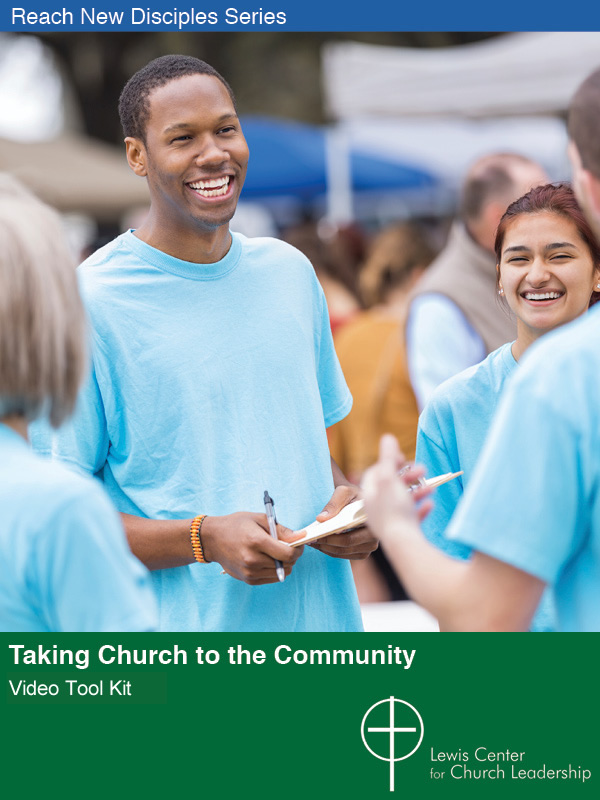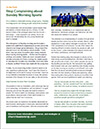Editor’s note: This is adapted from an article by Keith Anderson which appeared in Leading Ideas on January 30, 2013. This To the Point version has been edited for brevity and is accompanied by a PDF that may be downloaded and shared with others.
It’s a common complaint among clergy types, “Sunday morning sports are taking people away from worship!”
The exasperation that accompanies it goes deeper than just whether a family shows up on a Sunday. It’s the lament of loss of the privileged place that the Church — and clergy — once enjoyed in our culture. But in our lament we risk alienating the very young families we seek to engage.
The emergence of Sunday morning sports is just a symbol of a shift that’s happening in society where the church is no longer given deference. Clergy resent this loss and mourn our diminishing cultural position. That’s what I hear just under the surface when clergy complain about Sunday morning sports — it’s the loss of our place, privilege, and position. Notice we never complain about activities scheduled for Friday evenings for Jewish people or Saturdays for Seventh-Day Adventists, much less Hindu or Muslim conflicts? Others have dealt with this a long time.
Frankly, it’s not a bad thing for the Church to stand on its own, apart from cultural props. I don’t want the Church to be dependent on the world saying it is important. I want us to say that this is important because of Jesus, the persuasiveness of the Gospel, for its own sake, on its own terms.
Help Families Reclaim Their Vocation
The problem is that our frustration, grief, and anger slip out in our preaching, conversations, and recruitment. It is guilt inducing, and we lose the grace we seek to extend to people. We have to watch our language, assumptions, and expectations, because most of them were formed in a culture that we don’t live in anymore.
We should save our lament for the families dependent on dual incomes, working two or more jobs, slammed with the cost of healthcare and education, who are consumed with kids’ activities. Sometimes in our institutional need for attendance, volunteers, pledges, and relevance, we miss the needs and realities of our people.
The antidote is an understanding of vocation through which people see their entire lives as their ministry. Martin Luther argued that “a holy calling” belonged to everyone. We call it the “priesthood of all believers,” but we often reduce the meaning of that to ministry done by lay people at, with, and for the church. Luther extended it far beyond church into our homes, workplaces, and neighborhoods.
Rather than wishing away the changes in culture, but far from simply accommodating them, let’s find a third way to talk about the life of faith, one in which parents can see all the shuttling around they do, the homework help, getting kids dressed, and, yes, even watching their kid play hockey on Sunday morning as ministry in and of itself. Let’s make their time at church something that renews and strengthens them for their ministry of family and parenting, rather than making them feel guilty for wanting to be at their kids’ games. Here are some questions to spark your planning.
Can we help people see their daily work — jobs, parenting — as holy, sacred work? Can we help them claim their life’s work as ministry, as spiritual practice?
Can our programming support this through ministry beyond the church to reinforce that God is present in pubs, coffee shops, play grounds, social media — anywhere people spend time and gather?
Can we help people to volunteer remotely, via phone or laptop, when they can grab a few spare moments between activities or when the kids are down?
Should we have an alternate worship time outside of Sunday morning?
“Godless Harvard”
My mentor Peter Gomes used to talk about the controversy that erupted at Harvard in the 19th century when Harvard stopped requiring its students to attend chapel. People mocked the decision and gave the school the moniker “Godless Harvard.” But many people continued to worship, and they knew why they were there — not because they were required to, but because they wanted to and Harvard continues to have a vibrant worshipping community today.
We risk making the same quick judgment in our time — that this is just godlessness all around — for we too would be wrong. While the church and its clergy may have been displaced in our culture, God has not. God is where God has always been — embedded in the lives of God’s people. So, let’s stop complaining about Sunday morning sports and start helping make the connections between their faith and their daily work, their vocation.
Keith Anderson, an Evangelical Lutheran Church in America pastor, is author of The Digital Cathedral: Networked Ministry in a Wireless World (Morehouse, 2015).
Download a PDF of this page to share with others.

 Lewis Center video tool kit resource
Lewis Center video tool kit resource
Reach New Disciples with “Taking Church to the Community”
Explore strategies your congregation can use to reach beyond its walls with worship, community events, ministries, and service. The Taking Church to the Community Tool Kit features engaging videos, presentations, and supplemental materials and is designed for both self study and for use with groups in your church. Learn more and watch introductory videos now.
 Learn to Reach Younger Generations with “The New Welcome”
Learn to Reach Younger Generations with “The New Welcome”
Learn concepts and strategies to welcome and respond to your first-time and repeat visitors, reach younger generations, expand your church’s entry points, and get new people involved. The New Welcome Video Tool Kit helps you open your church to the transformative presence of new people — welcoming newcomers by acknowledging the changing ways that people enter into the life of churches. Learn more and watch introductory videos now.






